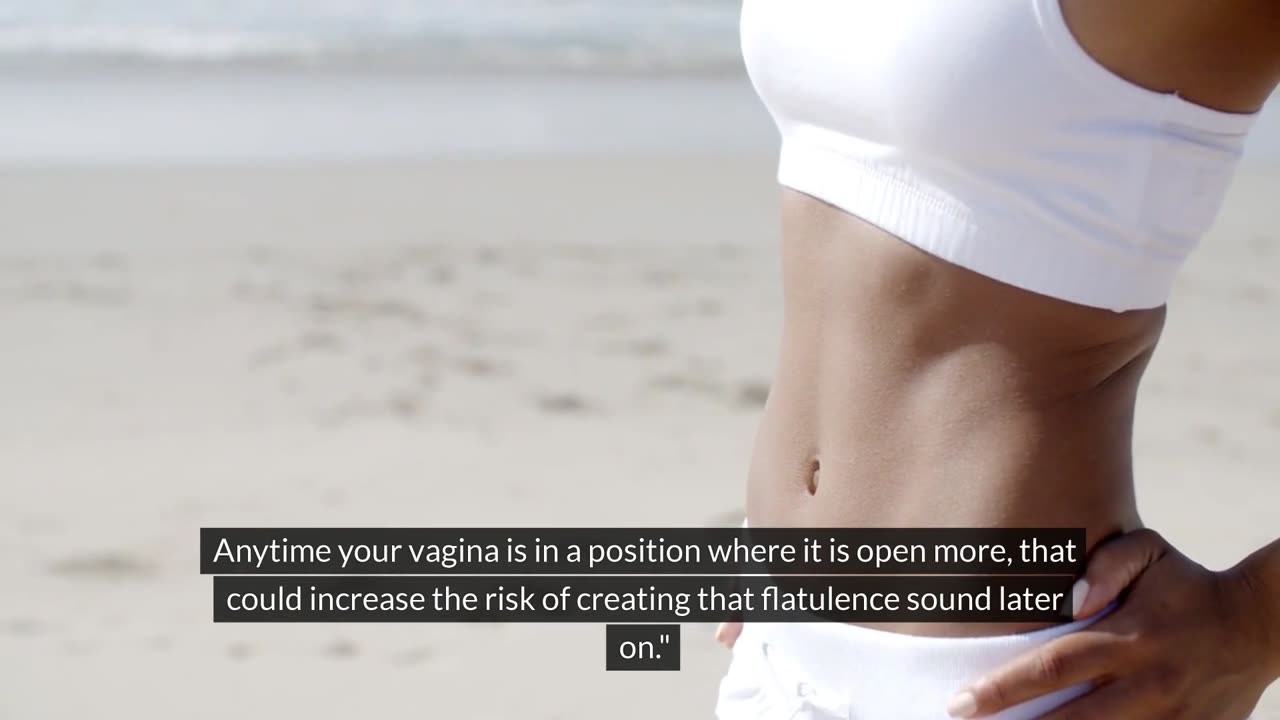Premium Only Content

"Dealing with Queefing: Understanding, Prevention, and Acceptance"
What It Is, Why It Happens, and How To Avoid It Whether you're in the middle of a peaceful yoga class or getting intimate in the bedroom, you may be surprised to hear your vagina let out a loud, fart-like sound. Vaginal flatulence, known as a queef, is just air moving out of your vagina. Activities like exercise and sex can accidentally push air into your vagina. Queefs may feel awkward and embarrassing, but they are completely normal. Still, you may find that your vagina queefs at the most unfortunate times. Read on to learn about queefing and what might help you prevent it from happening. What Is a Queef?Vaginal flatulence or vaginal wind[1] is an emission or expulsion of air from the vagina. It may occur during or after sexual intercourse or during other sexual acts, stretching or exercise.[1] The sound is often comparable to flatulence from the anus, but does not involve waste gases, and thus often does not have a specific odor associated. Slang terms for vaginal flatulence include queef,[2][3] vart, and fanny fart (mostly British).[4][5] Tampons can treat or prevent vaginal wind.[1] Serious conditions Vaginal gas with a strong odor of fecal matter may be a result of rectovaginal fistula, a serious condition involving a tear between the vagina and colon, which can result from surgery, childbirth, diseases (such as Crohn's disease), or other causes.[6] This condition can lead to urinary tract infection and other complications. Vaginal gas can also be a symptom of an internal pelvic organ prolapse,[7] a condition most often caused by childbirth.[8] Puffs or small amounts of air passed into the vaginal cavity during cunnilingus are not known to cause any issues. However, "forcing" or purposely blowing air at force into the vaginal cavity can cause an air embolism, which in very rare cases can be dangerous for the woman, and if pregnant, for the fetus What Causes Queefing? Queefing is just part of the mechanics that come with having a vagina, said Dr. Greves. Activities like exercise, masturbation, and sex can all unintentionally put air into the vagina and cause queefing.1 Neels H, Mortiers X, de Graaf S, et al. Vaginal wind: A literature review. Eur J Obstet Gynecol Reprod Biol. 2017;214:97-103. doi:10.1016/j.ejogrb.2017.04.033 "Sex can involve a lot of thrusting, typically pushing extra air into a dead-end space," Sherry A. Ross, MD, an OB-GYN and the author of "She-ology: The Definitive Guide to Women's Intimate Health. Period," told Health. "Inserting tampons, diaphragms, and menstrual cups can also push air into the vagina leading to queefing." Certain forms of exercise—like yoga, stretching, and core work—can potentially open and stretch the vagina, allowing air in and out. Queefing can happen to anyone with a vagina. Folks who have had a vaginal delivery or have urinary incontinence may be more likely to queef than others.1 Research has found those folks may have a weaker pelvic floor, or the muscles that support the uterus, bowel, and bladder. A weak pelvic floor may increase the risk of queefing.3 How To Prevent It Queefing is a natural part of having a vagina. Although awkward at times, there is no reason to feel embarrassed or ashamed if it happens to you. There is no guaranteed way to avoid queefing. Still, performing targeted pelvic floor exercises called Kegels may help you queef less if you have pelvic floor issues. Kegels are not a proven treatment for queefs, but since those exercises can strengthen weak pelvic floor muscles, they may, in theory, reduce the risk of queefing.4 To do Kegels, squeeze your pelvic muscles and hold for three seconds, then relax for three seconds. Repeat 10 times about three times a day. Make sure your bladder is empty before getting started.5 Your best bet is to not worry about queefing so much, accept it happens, and remind yourself that it's natural. "It's best to enjoy these awkward moments by laughing about it and knowing you both are probably having a really great time creating the queefing effect," said Dr. Ross. Do Certain Sex Positions Prevent It? "Unfortunately, there aren't really any specific sex positions that can prevent it," said Dr. Greves. "Anytime your vagina is in a position where it is open more, that could increase the risk of creating that flatulence sound later on." That said, some positions are more queef-inducing than others, said Dr. Ross. "Certain sex positions, such as doggy style and inverted missionary, seem to increase the queefing effect," explained Dr. Ross. While it's not proven, a position like traditional missionary may minimize the amount of air getting into the vagina, resulting in fewer queefs, said Dr. Greves. Missionary involves you lying on your back. Typically, in that position, your vagina is less open for air to ente
-
 1:20:04
1:20:04
Tim Pool
4 days agoGame of Money
23.9K9 -
 2:21:11
2:21:11
Nerdrotic
8 hours ago $12.94 earnedDown the Rabbit Hole with Kurt Metzger | Forbidden Frontier #090
67.3K16 -
 2:41:13
2:41:13
vivafrei
13 hours agoEp. 251: Bogus Social Security Payments? DOGE Lawsduit W's! Maddow Defamation! & MORE! Viva & Barnes
205K247 -
 1:19:23
1:19:23
Josh Pate's College Football Show
6 hours ago $2.14 earnedBig Ten Program Rankings | What Is College Football? | Clemson Rage| Stadiums I Haven’t Experienced
49.6K1 -
 LIVE
LIVE
Vigilant News Network
11 hours agoBombshell Study Reveals Where the COVID Vaccine Deaths Are Hiding | Media Blackout
1,802 watching -
 1:17:59
1:17:59
Sarah Westall
7 hours agoDOGE: Crime & Hysteria bringing the Critics & the Fearful - Plus new CDC/Ukraine Crime w/ Dr Fleming
31.2K3 -
 45:39
45:39
Survive History
13 hours ago $3.76 earnedCould You Survive in the Shield Wall at the Battle of Hastings?
38.7K5 -
 1:50:28
1:50:28
TheDozenPodcast
11 hours agoViolence, Abuse, Jail, Reform: Michael Maisey
82.3K4 -
 23:01
23:01
Mrgunsngear
1 day ago $4.41 earnedWolfpack Armory AW15 MK5 AR-15 Review 🇺🇸
72.5K12 -
 25:59
25:59
TampaAerialMedia
1 day ago $2.26 earnedUpdate ANNA MARIA ISLAND 2025
44.2K4